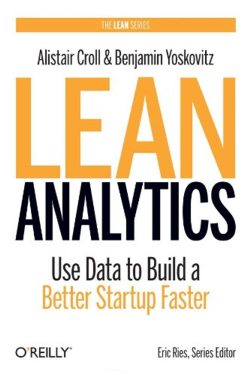| Lean Analytics, Use Data to Build a Better Startup Faster |
Author: Alistair Croll and Benjamin Yoskovitz You have to admire a book that starts “Let’s face it: you’re delusional.” Author: Alistair Croll and Benjamin Yoskovitz You have to admire a book that starts Chapter 1 (titled “We’re all Liars”) with the sentence: “Let’s face it: you’re delusional.” This assertion may or may not be true (YMMV), but it does give a hint that this isn’t going to be a dull read. In theory, this is a book aimed at people who want to start up a business using the Lean Startup technique. This is designed to help would-be entrepreneurs identify the riskiest parts of their business plan, then find ways to reduce the risks. Described like that, you may not think it’s of interest, but in fact the technique uses data analysis for the basis of decisions, and there are parts where the book could actually be titled ‘applied statistics and analytics’. There are around thirty case studies included within the book looking at real-life successful startups, and these make interesting reading in their own right.
The book is split into four parts, starting with an explanation of what the Lean Startup technique is, along with basic analytics and reviews of a number of existing frameworks. Chapter One (We’re all Liars) points out that while you can con yourself based on opinion, delusions wither under the harsh light of data. This does depend, I feel, on how good you are at massaging the stats, but the basic idea is sound. The next chapter looks at how to keep score – working out what you should be measuring to decide whether you’re succeeding or not in the activity you’re analyzing. There’s an interesting chapter on data-driven versus data-informed that discusses the need for having both good data analysis and the ability to step back and look beyond the headline results.
Part II is titled ‘Finding the Right Metric for Right Now’, and looks at how to use analysis in a business. The authors take six sample business models – e-commerce, software as a service, free mobile app, media site, user-generated content, and two-sided market places. In each case the authors describe the way the business model works, the data metrics that can be used to measure its success, and the stages necessary to the right product and the best target market by using data analysis. Most of the chapters have a case study of a startup that’s succeeded with details of how they used data analysis to help. The next part of the book looks at how to work out whether you’re doing well or badly. The examples in this section illustrate ideas such as the need to work out what to measure – it’s no use increasing page hits if you need to be increasing advertising click-through, for example. There’s a short chapter for each of the business models from earlier looking at what constitutes success and how to measure it. The final section looks at putting lean analytics to work, with chapters on selling to enterprise customers; changing an existing business from within; and a look at what happens when you’ve gone beyond being a startup. I picked up this book prepared to be irritated, especially as the title had led me to expect some nice straightforward data analysis techniques. Once I’d realized what the book was about, I expected it would be marketing and business school spin. There is an element of that, but I ended up a reluctant admirer of the authors and what they were saying. These guys aren’t marketing men jumping on the big data bandwagon; they make real use of statistics and data analysis to give insights into how to make your business better. If you’re thinking of starting a business, there are some real home truths in this book that may prevent your business failing. If you’re a data analyst, the book is worth reading as a lesson in how to get business people to understand what to analyze and why it matters. Parts of the book are now available DRM-free for educators for use in entrepreneurship courses. The resources include a PDF of all of the case studies, color diagrams of the book's six business models, a master table that shows metrics for each of the stages and business models and a slide deck in Keynote and Powerpoint formats, containing other content. Educators who incorporate this content can also get discounts for textbooks for their students. The book's website has details on its page Lean Analytics for Educators.
|
|||
| Last Updated ( Wednesday, 27 November 2013 ) |


